[This is article now been cross-published by Salon...]
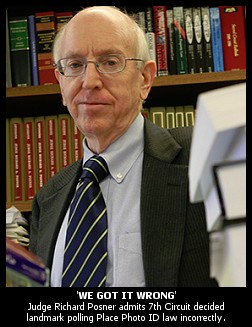 This is nothing less than remarkable. The 7th circuit court judge who wrote the majority opinion in the landmark Crawford v. Marion County Election Board case, has now admitted he got it wrong!
This is nothing less than remarkable. The 7th circuit court judge who wrote the majority opinion in the landmark Crawford v. Marion County Election Board case, has now admitted he got it wrong!
"I think we did not have enough information," Judge Richard Posner said in remarks at HuffPo Live today. "If the lawyers had provided us with a lot of information about the abuse of voter identification laws, this case would have been decided differently."
Crawford is the Indiana polling place Photo ID restriction case that went to the U.S. Supreme Court where it was upheld in 2008. It is the case cited, usually inaccurately, by Republican advocates of such restrictions, who argue that such disenfranchising laws are not in violation of the U.S. Constitution. For example, it is the case cited (inaccurately) by TX Attorney General Greg Abbott, in his argument against the U.S. Dept. of Justice's current lawsuit attempting to block the Lone Star State's most recent attempt to institute that voting restriction at their polling places. "The U.S. Supreme Court has already ruled that voter ID laws do not suppress legal votes," Abbott said misleadingly in response to the DoJ's suit, as explained in detail last month by BRAD BLOG legal analyst Ernest Canning.
But, setting aside the misuse of SCOTUS' very limited ruling on Crawford, the remarkable news today comes via UC Irvine election law professor Rick Hasen, who transcribes remarks made today by Judge Richard Posner, author of the original 7th circuit majority opinion in Crawford, now completely recanting his original opinion on the case!
Read this from Hasen. It's amazing...
"Yes. Absolutely. And the problem is that there hadn’t been that much activity with voter identification. And … maybe we should have been more imaginative… we…. weren’t really given strong indications that requiring additional voter identification would actually disfranchise people entitled to vote. There was a dissenting judge, Judge Evans, since deceased, and I think he is right. But at the time I thought what we were doing was right. It is interesting that the majority opinion was written by Justice Stevens, who is very liberal, more liberal than I was or am…. But I think we did not have enough information. And of course it illustrates the basic problem that I emphasize in book. We judges and lawyers, we don’t know enough about the subject matters that we regulate, right? And that if the lawyers had provided us with a lot of information about the abuse of voter identification laws, this case would have been decided differently.”
Here’s the quote from Posner’s book, which Mike Sacks flashed on the screen: "I plead guilty to having written the majority opinion (affirmed by the Supreme Court) upholding Indiana’s requirement that prospective voters prove their identity with a photo id—a law now widely regarded as a means of voter suppression rather than fraud prevention."
We have written at enormous length and breadth over many years here at The BRAD BLOG about how polling place Photo ID restrictions disproportionately disenfranchise minority, student and elderly voters. (Again, see Canning's most recent coverage of the DoJ's latest case against Texas to get a small idea.) We've also reported, for years, on how Republicans attempting to institute these laws know that they will disenfranchise voters who tend to lean towards Democrats.
 By way of one example, in TX, according to the DoJ's analysis of the state's own data supplied to them, "Hispanic registered voters are more than twice as likely as non-Hispanic registered voters to lack such identification." In South Carolina, where the DoJ blocked a similar law there last year under Section 5 of the Voting Rights Act, they found [PDF] that --- again, according to the state's own data --- "minority registered voters were nearly 20% more likely to lack DMV-issued ID than white registered voters, and thus to be effectively disenfranchised" by the state's new Photo ID restriction law.
By way of one example, in TX, according to the DoJ's analysis of the state's own data supplied to them, "Hispanic registered voters are more than twice as likely as non-Hispanic registered voters to lack such identification." In South Carolina, where the DoJ blocked a similar law there last year under Section 5 of the Voting Rights Act, they found [PDF] that --- again, according to the state's own data --- "minority registered voters were nearly 20% more likely to lack DMV-issued ID than white registered voters, and thus to be effectively disenfranchised" by the state's new Photo ID restriction law.
For the most part, the only thing that GOP proponents of these laws have had to hang their hats on for all of these years, in regard to legal findings on this type of voter suppression law, has been the 2008 SCOTUS ruling upholding Crawford, though even that ruling never made a determination that Photo ID laws "do not suppress legal votes" as Abbott dishonestly argued recently in TX.
In its 2008 decision, the U.S. Supremes found only that Indiana's version of the law did not disenfranchise voters "on its face", as Canning reported, because the plaintiff attorneys "failed to offer evidence establishing that any voter would either be disenfranchised or unduly burdened by the state's Photo ID restrictions. As a facial challenge, there was simply no evidence presented in the case to dispute the District Court's finding that the Indiana statute did not impose an undue burden" on voters.
But the Court also left the door open for a case in the future that might include specific evidence of whether or not such laws, when instituted in places such as Texas --- where it is very difficult for many voters (disproportionately minority voters, specifically) to obtain the requisite ID needed to vote under this type of restriction --- actually disenfranchised voters. A future SCOTUS case, examining the actual effect of such laws, is almost certain.
Following the Supreme Court's gutting of the Voting Rights Act over the summer Republican-controlled states have raced to implement polling place Photo ID restrictions in jurisdictions, such as TX and North Carolina, where it had been previously blocked by provisions of the VRA. States such as Pennsylvania and Wisconsin have long been attempting to enact such polling place restrictions as well, often citing the Crawford case as the precedent to allow them to do so.
Now, the very judge who wrote the ruling in the original case later approved by the U.S. Supreme Court is abandoning ship, and directly admitting he got it completely wrong. That the only case of note used by supporters of this kind of voting restriction has now been pretty much disowned by the judge who wrote its majority decision is simply a remarkable development in this years-long battle.
UPDATE 10/14/13: In comments below, Bill Groth, lead counsel for the Indiana Democratic Party in the Crawford case, takes some exception to our characterization of the evidence offered during the actual trial and, seemingly, to Posner's characterization of it as well. See comments below for his response...
UPDATE 10/16/13: Posner says he is surprised by the response to his disavowal of his own Photo ID ruling, adding that he wasn't "alert" to the extent of "trickery" used in elections these days. Details here...
UPDATE 10/28/2013: Rightwing smears Posner; Others say 'we told ya so!'; Justice John Paul Stevens, who wrote controlling opinion in SCOTUS affirmation of Crawford, says he agrees with him that they all go it wrong. Details here...
UPDATE 10/29/2013: Seriously? Yes, seriously. Posner now attempts to recant his recantation!...


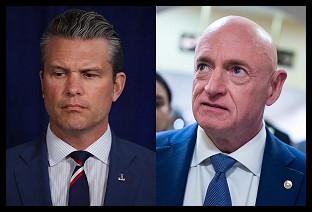 Court Blocks Hegseth Censure of Sen. Mark Kelly
Court Blocks Hegseth Censure of Sen. Mark Kelly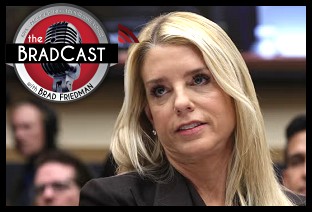 Harpy Tantrums, Legal Losses, Election Fails, Retreating ICE and Other Hopeful Signs: 'BradCast' 2/12/26
Harpy Tantrums, Legal Losses, Election Fails, Retreating ICE and Other Hopeful Signs: 'BradCast' 2/12/26 'Green News Report' 2/12/26
'Green News Report' 2/12/26
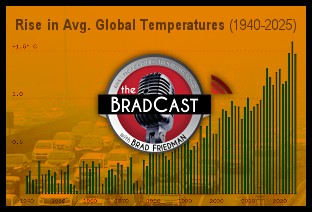 'Let Kids with Asthma Suffer': Trump to Reverse EPA's Landmark 'Endangerment Finding': 'BradCast' 2/11/26
'Let Kids with Asthma Suffer': Trump to Reverse EPA's Landmark 'Endangerment Finding': 'BradCast' 2/11/26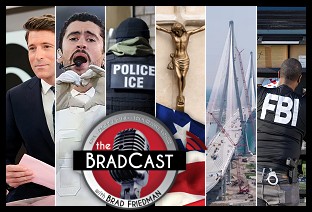 Trump's Presidency Now About Little More Than Racism, Corruption, Culture War Nonsense: 'BradCast' 2/10/26
Trump's Presidency Now About Little More Than Racism, Corruption, Culture War Nonsense: 'BradCast' 2/10/26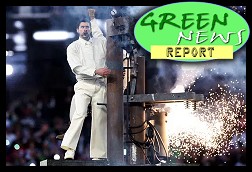 'Green News Report' 2/10/26
'Green News Report' 2/10/26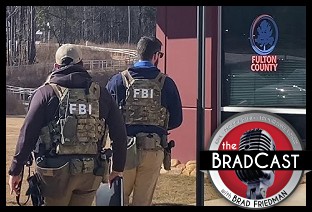 About Trump's FBI Raid of the Fulton County, GA Elections Warehouse: 'BradCast' 2/9/26
About Trump's FBI Raid of the Fulton County, GA Elections Warehouse: 'BradCast' 2/9/26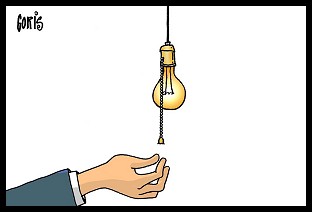 Sunday 'Dead in Darkness' Toons
Sunday 'Dead in Darkness' Toons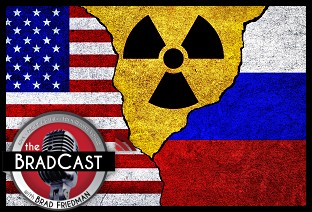 'New START' Treaty Allowed to End Amid New World Disorder: 'BradCast' 2/5/26
'New START' Treaty Allowed to End Amid New World Disorder: 'BradCast' 2/5/26 'Green News Report' 2/5/26
'Green News Report' 2/5/26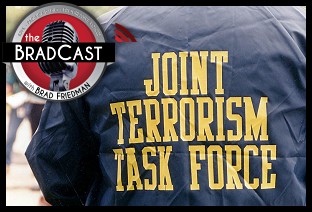 Trump Turns 'War on Terror' Tools Against Domestic Political Foes: 'BradCast' 2/4/26
Trump Turns 'War on Terror' Tools Against Domestic Political Foes: 'BradCast' 2/4/26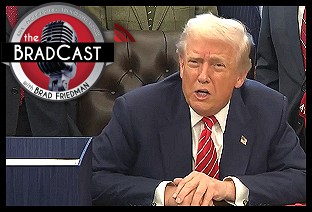 Losing Legally and Politically, Trump Threatens to 'Nationalize' Elections: 'BradCast' 2/3/26
Losing Legally and Politically, Trump Threatens to 'Nationalize' Elections: 'BradCast' 2/3/26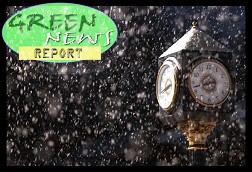 'Green News Report' 2/3/26
'Green News Report' 2/3/26 Bad and Good Bunnies, and an Electoral Shock in Deep 'Red' TX: 'BradCast' 2/2/26
Bad and Good Bunnies, and an Electoral Shock in Deep 'Red' TX: 'BradCast' 2/2/26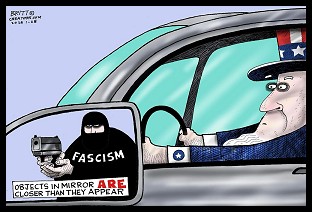 Sunday 'Mirror, Mirror' Toons
Sunday 'Mirror, Mirror' Toons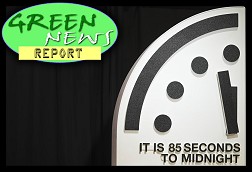 'Green News Report' 1/29/26
'Green News Report' 1/29/26 It's About Elections and the Windmills of His Mind: 'BradCast' 1/29/26
It's About Elections and the Windmills of His Mind: 'BradCast' 1/29/26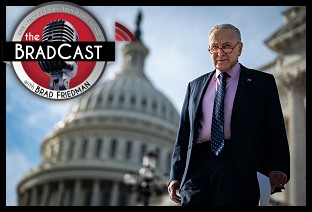 Govt Shutdown Over ICE Funding Near Certain This Weekend: 'BradCast' 1/28/26
Govt Shutdown Over ICE Funding Near Certain This Weekend: 'BradCast' 1/28/26 Trump Blinks, Bovino Out, MN Op Falters, Persists as Midterms Loom: 'BradCast' 1/27
Trump Blinks, Bovino Out, MN Op Falters, Persists as Midterms Loom: 'BradCast' 1/27  The ICE Murder of ICU Nurse Alex Pretti and the Heroes of Mpls: 'BradCast' 1/26/26
The ICE Murder of ICU Nurse Alex Pretti and the Heroes of Mpls: 'BradCast' 1/26/26  The BRAD BLOG: 22 Years and Still Counting
The BRAD BLOG: 22 Years and Still Counting Mr. Smith Testifies (Publicly) in Washington: 'BradCast' 1/22/26
Mr. Smith Testifies (Publicly) in Washington: 'BradCast' 1/22/26 World Turning Against Self-Destructing U.S. Under Trump: 'BradCast' 1/21/26
World Turning Against Self-Destructing U.S. Under Trump: 'BradCast' 1/21/26 Trump Waste, Fraud, Abuse on Voting, at DOJ, by DOGE: 'BradCast' 1/20/26
Trump Waste, Fraud, Abuse on Voting, at DOJ, by DOGE: 'BradCast' 1/20/26
 VA GOP VOTER REG FRAUDSTER OFF HOOK
VA GOP VOTER REG FRAUDSTER OFF HOOK Criminal GOP Voter Registration Fraud Probe Expanding in VA
Criminal GOP Voter Registration Fraud Probe Expanding in VA DOJ PROBE SOUGHT AFTER VA ARREST
DOJ PROBE SOUGHT AFTER VA ARREST Arrest in VA: GOP Voter Reg Scandal Widens
Arrest in VA: GOP Voter Reg Scandal Widens ALL TOGETHER: ROVE, SPROUL, KOCHS, RNC
ALL TOGETHER: ROVE, SPROUL, KOCHS, RNC LATimes: RNC's 'Fired' Sproul Working for Repubs in 'as Many as 30 States'
LATimes: RNC's 'Fired' Sproul Working for Repubs in 'as Many as 30 States' 'Fired' Sproul Group 'Cloned', Still Working for Republicans in At Least 10 States
'Fired' Sproul Group 'Cloned', Still Working for Republicans in At Least 10 States FINALLY: FOX ON GOP REG FRAUD SCANDAL
FINALLY: FOX ON GOP REG FRAUD SCANDAL COLORADO FOLLOWS FLORIDA WITH GOP CRIMINAL INVESTIGATION
COLORADO FOLLOWS FLORIDA WITH GOP CRIMINAL INVESTIGATION CRIMINAL PROBE LAUNCHED INTO GOP VOTER REGISTRATION FRAUD SCANDAL IN FL
CRIMINAL PROBE LAUNCHED INTO GOP VOTER REGISTRATION FRAUD SCANDAL IN FL Brad Breaks PA Photo ID & GOP Registration Fraud Scandal News on Hartmann TV
Brad Breaks PA Photo ID & GOP Registration Fraud Scandal News on Hartmann TV  CAUGHT ON TAPE: COORDINATED NATIONWIDE GOP VOTER REG SCAM
CAUGHT ON TAPE: COORDINATED NATIONWIDE GOP VOTER REG SCAM CRIMINAL ELECTION FRAUD COMPLAINT FILED AGAINST GOP 'FRAUD' FIRM
CRIMINAL ELECTION FRAUD COMPLAINT FILED AGAINST GOP 'FRAUD' FIRM RICK SCOTT GETS ROLLED IN GOP REGISTRATION FRAUD SCANDAL
RICK SCOTT GETS ROLLED IN GOP REGISTRATION FRAUD SCANDAL VIDEO: Brad Breaks GOP Reg Fraud Scandal on Hartmann TV
VIDEO: Brad Breaks GOP Reg Fraud Scandal on Hartmann TV RNC FIRES NATIONAL VOTER REGISTRATION FIRM FOR FRAUD
RNC FIRES NATIONAL VOTER REGISTRATION FIRM FOR FRAUD EXCLUSIVE: Intvw w/ FL Official Who First Discovered GOP Reg Fraud
EXCLUSIVE: Intvw w/ FL Official Who First Discovered GOP Reg Fraud GOP REGISTRATION FRAUD FOUND IN FL
GOP REGISTRATION FRAUD FOUND IN FL

































